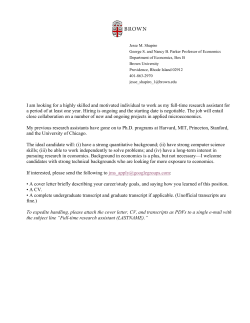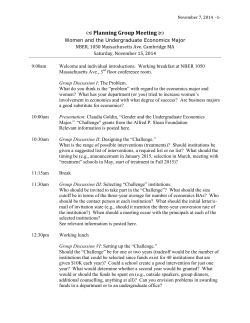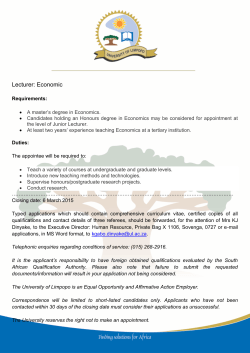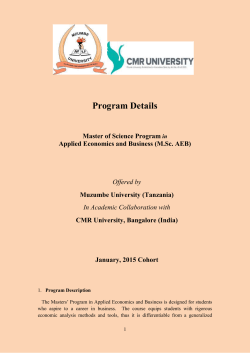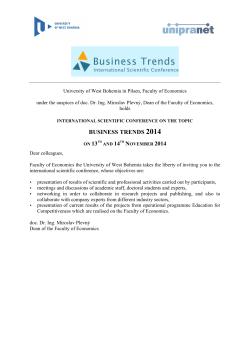
student guide 2015.2016 - Ecole d`économie
School of Economics Guide for students in mobility 1 Presentation of the School of Economics The new School of Economics, created from the separation of the Faculty in Economics and Management in 2012, is currently the newest to be found in France. Its activity comprises educational and research projects in the field of international development economics, as well as the organization of scientific events with high international recognition. The School of Economics provides courses for undergraduate, postgraduate and PhD students. The Bachelor’s degree covers a wide range of subjects in law, economics and management. Students study the subjects that interest them and specialize over a period of time, thus acquiring the core methodological tools and building a personal educational project. The masters programs on offer, which concern about three hundred students, are strongly connected with the research carried out by the CERDI (Research laboratory: center for studies and research in international development). The teaching program gives the students the opportunity to specialize in development economics, allowing them to quickly gain employment or admission into doctoral research. The CERDI and the School of Economics host about 30 PhD students in international development economics with about ten (10) PhD degrees awarded per year. Teachers and researchers in economics have been making strategic choices for many years. They have been working hard at developing in Clermont-Ferrand a comparative advantage in international development economics. Both past evaluation from our peers and professional achievements of alumni have shown the full relevance of this choice. That is why today our school benefits from a good reputation either at national or international level in an increasingly competitive environment. The teaching staff includes about fifty researchers including foreign visiting professors. The Master’s program offers a range of specialized subjects open to either full time students or working professionals. The success of the Master’s is based on national and international links with French or foreign universities, with the educational department of the French Development Agency (AFD), the University of Auvergne Foundation (FudA), the Foundation for International Development Study and Research (FERDI), the Banque de France, and more generally with some leading academics or professionals in the field of development economics. The School of Economics has a policy of recruiting students originating from all geographical areas, and in particular developing and emerging countries. Fifty percent of our students come from abroad, with a high number of African students. The School of Economics has maintained relations with an active network of alumni, most of whom now hold important positions in this field. This network facilitates the search for internships in companies or international organizations. The School of Economics is delighted to welcome exchange students for short durations, one or two semesters, in the frame of Erasmus or bilateral agreements. The international relations office is doing its best to provide all necessary assistance to these visitors, encouraging professors to offer more and more classes in English, in order to facilitate adaptation to students who do not master the French language. However, “French as a Foreign Language” lectures are also provided, free of charge: foreign students have the possibility of improving their proficiency in French, and benefit from civilization classes. 2 Quick presentation of Auvergne Students will discover the Auvergne region, and the Auvergne volcanoes regional natural park, one of Europe’s oldest and largest natural park, an area of wonderful landscapes. It offers numerous possibilities of hiking, biking, skiing, and practicing all mountain, aerial, speed river sports. As a thermal region, Auvergne also proposes relaxation in thermal baths, and you will certainly enjoy its typical culinary art. Auvergne, with its remarkable sites of historic heritage is also a region of arts: many castles and roman churches to see, and several “most beautiful villages” are worth a visit too. Capital city of the short film festival (held in February), the city of Clermont-Ferrand also offers a wide range of activities: concerts all year round –Europavox Festival in June lasts a whole week and hosts many European musicians-, shopping, terraces, nightlife, flea markets, parks and gardens, exhibition and museums…where you may even meet the Michelin Man, Clermont-Ferrand being his place of birth! Registration procedure Partner Universities send to the School of Economics the list of nominated students, with their e-mail information. The School of Economics international office contacts the students to inform them of the various documents to provide in order to be registered. The Melting Club will also contact newcomers. The melting Club is a group of students, who have already studied abroad, and who wish to welcome foreign students in the School and the city. They will pick them up at their arrival point, lead them to accommodation, introduce them to other students, help them out with bank, telephone…and all small troubles they may meet when settling down. Before arrival, you will need to provide the following documents to Claudine Belot, Office of International Relations (can be downloaded on the School’s website: www.economie.u-clermont1.fr) • • • • • • • • Registration file (to be found at the end of this document) Transcript of record of the current and past academic years One photo Copy of the current student card Copy of an ID Copy of the European Health Card for European students. Others will have to prove their medical coverage, and private insurance. Documents must be translated in French or English. Projected learning Agreement (choice of courses) Proof of proficiency in French or English (according to the language of the courses you will attend) is required: either a test score (DELF, DALF, TCF) or a letter from a French or English professor, certifying a minimum level B2. 3 If you are not an EU citizen, you also have to register on the Campus France Website of your country in order to obtain a student visa for the duration of your stay in France. http//www.nameofthecountry.campusfrance.org For instance for Brazil: http//www:brazil.campusfrance.org If there is no Campus France office in your country, then you will apply directly to the French consulate. The office of International Relations will send you a proof of residence (in a residence hall), and a letter of invitation from the University of Auvergne. Those two documents are necessary to obtain a visa. You will also need to provide a proof of insurance: personal liability, medical care (including surgery), and sanitary repatriation. If you lack that type of coverage, the Université d’Auvergne services will provide you with the minimum compulsory coverage: French social security, and propose you different contractors for a complementary coverage, highly recommended. Information contact: Claudine Belot Claudine.belot@udamail.fr Ecole d’Economie Service des Relations Internationales 41 Boulevard François Mitterrand CS20054 63002 Clermont-Ferrand France +33 4 73 17 74 63 Arriving in Clermont-Ferrand You can travel by bus, train, car, or you can fly to Clermont-Ferrand. To organize your trip, you can visit the SNCF website (for trains): www.voyages-sncf.com and the airport website: www.clermont-aeroport.com Members of the Melting Club will welcome you either at the airport or the train station or the bus station, provided you have given them the proper information on your arrival date, time and place. Accommodation All international students are proposed a room in a student’s residence hall. Students who wish booking a room in a residence (9 square meters, basic but clean with internet connection) just have to mention it in the registration file they have to complete. Your attention is drawn on the fact that once the rooms are booked, they have to be paid for until the end of the semester. There are two residences, both of them within short walking distance of the School of Economics buildings. 4 Résidence Philippe-Lebon 28 boulevard Côte-Blatin 63000 Clermont-Ferrand Tél. : 04 73 43 72 72 Fax. : 04 73 43 72 14 E-mail : cite-lebon@crous-clermont.fr • • 258.75 € per month. Financial support of the French Government: around ninety euros per month. Go to www.caf.fr Furnished 9 square meters rooms, equipped with shower, toilets, sink and individual refrigerator, with free access to internet (with cable). Collective kitchen on each floor. Résidence du Clos Saint-Jacques 25 rue Etienne-Dolet 63037 Clermont-Ferrand Cedex 1 Tél. : 04 73 34 44 00 Fax. : 04 73 34 44 74 E-Mail : residclos@crous-clermont.fr • • • Traditional rooms 177, 65 €: furnished 9 square meters rooms: a bed, a cupboard, two chairs and a sink. Collective kitchen and sanitary facilities on each floor. No internet connection in the room. Renovated rooms 258, 75 €: furnished 9 square meters rooms, equipped with shower, toilets, sink and individual refrigerator, with free access to internet (with cable). Collective kitchen on each floor. Financial support from the French government: around ninety euros per month for renovated rooms, around fifty euros per month for a traditional room. Go to www.caf.fr Students may choose to rent an apartment downtown, alone or in flat-sharing. Prices vary between 250 euros and 400 to 500 euros. See the following websites: www.leboncoin.fr/annonces/offres/auvergne/ www.info-jeunes.net/ 5 www.clermont-ferrand.fr/-Espace-jeunes-.html www.colocation.fr/Clermont-Ferrand Living costs • • • • • Rent: from 100 €/month in a room of a students’ residence, up to 500€ for a studio downtown Food: 300 €/month. In university restaurants, you can have lunch and dinner for 3.10 euros (with your student ID) Books: not compulsory Fees: 5.10 euros (medicine) are compulsory. You may be asked up 10 euros to practice sports. Miscellaneous: the figures may vary according to your lifestyle Transportation in Clermont-Ferrand • • There is no public transportation from the airport to downtown Clermont-Ferrand. If you don’t ask for students to pick you up, you will have to use a taxi (20 euros). The residences and faculties are situated downtown, and everything is within walking distance. Nevertheless, there is a bus and tram service that can take you everywhere downtown and around the city. Visit www.t2c.fr for more accurate information. Ticket 1.40 10 tickets 12.10 € Ticket 24 hours 4.30 € Week Ticket 13.90 € Student year travel card 244.80 € Student month travel card 28.60 € 6 Courses at bachelors’ level The courses open to exchange students at bachelor’s level are listed below. A translation of the title in English is proposed, but all classes are not taught in English, please check the column: “taught in English». You can also find this information on our website: www.economie.u-clermont1.fr YEAR ONE ANNEE SEMESTRE CODE 1 1 1 1 1 1 1 1 1 1 1 1 1 1 1 1 1 1 1 1 1 1 1 1 1 1 1 1 1 1 1 1 1 1 1 1 1 1 1 1 1 1 1 2 2 2 2 1 2 2 2 2 2 2 2 2 2 2 E1101 E1102 E1103 E1104 E1105 E1106 S1101 S1102 D1101 E1107 E1108 B1101 B1102 B1103 E1210 E1211 E1213 E1214 G1201 E1215 E1216 S1201 S1202 E1217 E1218 B1201 B1202 B1203 B1204 INTITULE COURSES Méthode de travail universitaire Study methods Introduction à l'économie Introduction to economics Grandes fonctions de l'entreprise Main activities of the firm Statistiques 1 Mathematics / statistics 1 Grands problèmes économiques contemporains Economic issues and trends Histoire des organisations et des faits économiques Economic facts and organizations history Introduction à la sociologie basics in sociology Introduction à la science politique Basics in politics Introduction au droit international public et européenBasics in international law Anglais English 1 Anglais de conversation English 2 Allemand (niveau minimum B1) German (minimum level B1) Anglais (niveau minimum B2) English (minimum level B2) Anglais conversation (niveau minimum B2) oral English (minimum level B2) Macroeconomie 1 Macroeconomics 1 Microéconomie 1 marchés et prix Microeconomics 1 Système d'information comptable Accounting 1 Statistiques 2 Mathematics / statistics 2 Principes de management Management principles Economie régionale et aménagement du territoire Regional Economics Formation aux outils et usages numériques IT sessions 1 Sociologie Sociology Science politique Political science Anglais English 3 Anglais de conversation English 4 Anglais (niveau minimum B2) English (minimum level B2) Anglais conversation (niveau minimum B2) oral English (minimum level B2) Allemand (niveau minimum B1) German (minimum level B1) Chinois pour débutants Chinese for beginners Also taught in english v v v v v v v v v v v v VOLUME HORAIRE/ ECTS SEMESTRE TD25 5 CM 30 TD 15 5 CM 30 TD 15 5 CM 30 TD 15 5 CM 20 2 CM 25 3 CM30 3 CM25 2 CM25 2 TD 20 3 TD 10 2 55 TD 5 44 TD 4 11 TD 1 CM 30 TD 15 5 CM 30 TD 15 5 CM 30 TD 15 5 CM 30 TD 15 5 CM 25 3 CM 25 3 TD 15 2 CM30 3 CM25 2 TD 20 3 TD 10 2 44 TD 4 11 TD 1 55 TD 5 30 TD 1 7 YEAR TWO ANNEE SEMESTRE CODE 2 2 2 2 2 2 2 2 2 2 2 2 2 2 2 2 2 2 2 2 2 2 2 2 2 2 2 2 2 2 2 2 2 2 1 1 1 1 1 1 1 1 1 1 1 1 1 1 1 1 1 2 2 2 2 2 2 2 2 2 2 2 2 2 2 2 2 2 E2101 E2102 E2103 E2104 E2105 E2106 E2107 S2101 S2102 D2101 E2108 E2109 G2101 B2101 B2102 B2103 B2104 E2201 E2202 E2203 E2204 E2205 E2206 E2207 E2208 E2209 E2210 E2211 E2212 E2213 B2202 B2203 B2204 B2205 INTITULE COURSES Also taught in english Macroéconomie 2: les politiques économiques Macroeconomics 2: economic policies v Microéconomie 2: comportements microéconomiques Microeconomics 2 v Comptabilité approfondie Accounting 2 L'entreprise et ses marchés Firms and Markets Droit des contrats 1 Business Law: contracts 1 Statistiques 3: Mathématiques/ statistiques appliquéesMathematics à l'économie/ et statistics à la gestion 3 v Economie du développement Development economics Problèmes démographiques contemporains Current demographic issues Histoire des idées politiques History of political thoughts Droit commercial Trade law Anglais English 5 v Anglais de conversation English 6 v Communication Communication Anglais (niveau minimum B2) préparation TOEIC + expression English (minimum orale level B2) TOEIC + listening/speaking v Espagnol(B2) Spanish (B2) v Allemand (niveau minimum B2) German (minimum level B2) v Chinois ( prérequis: cours B1203) Chinese (prerequisite course B1203) v Macroéconomie 3: macroéconomie approfondie Macroeconomics 3: advanced macroeconomics v Banques et marchés financiers Banks and finance v Microéconomie 3: économie industrielle, concurrence,Micoreconomics stratégies 3 v Structures et organisations Structures and organizations v Fondements du marketing Bases of marketing v Comptabilité de gestion Accounting 3 Fondements de la gestion des ressources humaines Bases of Human Resources Statistiques 4: Mathématiques/statistiques appliquéesMathematics à la gestion et / statistics à l'économie 4 v Finances publiques Public finance Formation aux outils et usages numériques IT sessions 2 Anglais English 7 Anglais de conversation English 8 Gestion de production production management 1 Allemand (niveau minimum B2) German (minimum level B2) v Espagnol(B2) Spanish (B2) v Leadership Leadership v Chinois (prerequis B2103) Chinese (prerequisite course B2103) v VOLUME HORAIRE/ SEMESTRE ECTS CM 30 TD 15 CM 30 TD 15 CM 30 TD 15 CM 20 CM 20 CM 30 TD 15 CM 30 CM25 CM30 CM25 TD 20 TD 10 CM 25 TD 30 TD 50 TD 50 TD 30 CM 20 CM 20 CM 20 CM 20 CM 20 CM 30 TD 15 CM 20 CM 30 TD 15 CM 40 TD 15 TD 20 TD 10 CM 20 TD 50 TD 50 TD 35 TD 30 5 5 5 3 2 5 2 1 2 2 1 1 2 2 2 2 1 2 3 3 3 2 5 2 5 2 1 1 1 2 3 3 2 1 8 YEAR THREE ANNEE SEMESTRE CODE 3 3 3 3 3 3 3 3 3 3 3 3 3 3 3 3 3 3 3 3 3 3 3 3 3 3 3 3 3 3 3 3 3 3 3 3 3 3 3 3 3 3 3 3 3 3 3 3 3 3 3 3 3 3 3 3 3 1 1 1 1 1 1 1 1 1 1 1 1 1 1 1 1 1 1 1 1 1 1 1 1 1 1 2 2 2 2 2 2 2 2 2 2 2 2 2 2 2 2 2 2 2 2 2 2 2 2 2 2 2 2 2 2 2 E3101 E3102 E3103 E3104 E3105 E3106 E3107 E3108 E3109 E3110 E3111 B3101 B3102 B3103 B3104 G3101 G3102 G3103 G3104 G3105 G3106 G3107 G3108 G3109 G3110 G3111 E3201 E3202 E3203 E3204 E3205 E3206 E3207 E3208 E3209 E3210 E3211 E3212 G3201 G3202 G3203 G3204 G3205 G3206 G3207 G3208 G3210 G3211 G3212 G3213 G3214 G3215 B3203 B3204 B3205 B3206 B3207 3 2 B3208 INTITULE COURSES Also taught in english Analyse économique de la croissance Growth economic analysis v Economie nationale et prévisions National Economics and forecasts Commerce international 1 International Trade 1 v Economie publique 1 Public economics 1 Théorie des jeux 1: les principes Bases of games theory conduite d'études économiques economic case studies Microéconomie 4: Economie du risque et de l'incertainMicroeconomics 4: Economics of risk Statistiques 5: Statistique inferentielle statistical inference: estimation and tests v Introduction à l'économétrie Introduction to econometrics Anglais English 9 Anglais de conversation English 10 Social issues and trends Social Issues and trends v Allemand (niveau minimum B2) German (minimum level B2) v Espagnol(B2) Spanish (B2) v Chinois Chinese v Fiscalité 1 Taxation 1 Contrôle de gestion 1 Management accounting v Gestion des Ressources Humaines Human resources management Droit Social Social law Anglais English Politique et actualité économique Economic policies and current issues Droit des Sociétés Corporate law Management et organisations d'Entreprises Corporate Management and organization Jeu d'entreprise Case study Stratégie d'Entreprise corporate strategies v Statistiques 6: Statistiques appliquées à la gestion Statistics for business Analyse de la conjoncture analysis of the economic situation v Analyse financière Financial analysis Commerce international 2 International trade 2 Développements récents de la pensée économique Current economic thought Econométrie appliquée Applied econometrics Dossier d'économie appliquée Applied econometrics: case study Théorie des jeux 2: applications Applied games theory Analyse économique de la croissance 2 Growth economic analysis II Analyse économique du droit Law economics Economie du travail Labour economics Anglais English 11 Anglais conversation English 12 Gestion financière Financial management Droit des contrats Business law: contrats 2 Contrôle de gestion approfondi Management accounting mathématiques financières Financial mathematics Comptabilité des sociétés Corporate accounting Fiscalité 2 Taxation 2 Informatique Corporate IT systems Anglais English Finance d'entreprise corporate finance v marketing opérationnel Strategic marketing Management de projet project management Introduction à la logistique d'entreprise Introduction to firms logistics Principes de la relation clients Principles of customer relationship management v Environnement public de l'entreprise Public environment of the firm Allemand (niveau minimum B2) German (minimum level B2) v Espagnol(B2) Spanish (B2) v English: doing business in different cultures English: doing business in different cultures v English: doing business in China English: doing business in China v Chinois Chinese v Microfinance v VOLUME HORAIRE/ SEMESTRE ECTS CM 20 CM 20 CM 25 CM 20 CM 20 TD 10 CM 20 CM 20 CM 30 TD 10 CM 20 TD10 TD 20 TD 10 CM 20 TD15 TD 55 TD 55 TD 30 CM20 TD 10 CM20 TD 10 CM20 CM 20 TD 30 CM 20 CM 20 CM 20 TD 10 TD 20 CM20 TD10 CM18 TD12 CM 20 CM 20 CM 20 CM 20 CM 10 TD 10 TD 20 TD 20 CM 20 CM 20 CM 20 TD 20 TD 10 CM10 TD10 CM20 CM20 TD10 CM20 TD10 CM20 TD10 CM20 TD10 CM10 TD20 TD30 CM20 TD10 CM20 TD10 CM20 TD10 CM20 TD10 CM20 TD10 CM20 TD 55 TD 55 CM 20 CM 10 TD 30 3 2 3 2 5 3 2 5 3 1 1 3 5 5 1 3 3 2 2 2 3 3 3 2 4 3 3 2 3 2 2 3 2 3 3 2 2 1 4 4 4 4 4 3 2 2 4 4 4 4 4 4 5 5 2 1 1 CM 20 2 9 Courses at masters’ level Courses offered in French only, at master level, year one at the school of economics. semestre 1 1 1 1 1 1 1 1 1 1 1 1 1 2 2 2 2 2 2 2 code EM1101 EM1102 EM1103 EM1104 EM1105 EM1106 EM1107 EM1108 EM1109 EM1110 EM1111 EM1112 EM1113 EM1201 EM1202 EM1203 EM1204 EM1205 EM1206 EM1207 LECTURES AND TUTORIAL CLASSES MASTER'S DEGREE IN ECONOMICS, FIRST YEAR (M1) intitulé de cours lecture Title Economie du développement development economics Economie européenne european economics Mondialisation et localisation globalisation and localisation Economie Publique public economics Théorie de la firme Firm theory Marchés d'actifs Financement international du developpement development international financing Finance de marché markets finance Econometrie 1 Econometrics 1 Gestion de bases de données Data basis management Statistiques statistics techniques d'enquête tools for inquiries anglais 1 English org et analyse comparée des systemes de santé health systems compared analysis and org ressources naturelles et environnement natural resources and environment Economies émergentes emerging economies Politique budgétaire et développement Budgetary politics and development Econométrie 2 Econometrics 2 Conduite de projets projects conduct anglais 1 English hours ECTS CM20 3 CM20 3 CM20 3 CM20 2 CM20 2 CM24 2 CM20 2 CM20 2 CM24 3 CM6 TD4 1 CM12 TD8 2 CM20 2 TD12 2 CM30 4 CM30 4 CM30 4 CM30 4 CM12 TD10 4 CM20 3 TD12 2 10 List of courses taught in English in economics, Finance and management at master level (For all other courses taught in French, please refer to the website.) ANNEE SEMESTRE CODE Master 1st Fall Master 2nd Fall Master 1st Spring Master 2nd Spring G4101 G4102 G4103 G4104 G4105 E5102 E5103 E5104 E5105 E5106 E5107 E5108 E5109 E5110 E5111 E5112 E5113 E5114 E5115 E5116 G5101 G5102 G5103 G5104 G5105 G5106 G5107 G4201 G4202 G4203 G4204 G4205 G5201 G5202 G5203 G5204 G5205 G5206 G5207 VOLUME HORAIRE/ SEMESTRE strategic management 21 Organizational management 21 English (minimum level B2) 21 governance and social responsibility in microfinance institutions21 business intelligence 21 International trade and development 20 development economics 12 Poverty and development 18 Foreign direct investment and firm strategies 10 Brics and worlf economy 16 Official development assistance and external provate financing 14 Economy policy evaluation 12 Natural resources economic principles 15 Climate change adaptation 10 International taxation 20 Public expenditures 16 complements in statistics 15 Macroeconometrics 16 Econometrics 14 Appraisal economic project 12 managerial accounting I CM 20 TD 10 Financial auditing and fraud 21 french and anglo saxon accounting 21 introduction to behavioral economics and finance 21 Theory of finance 21 economics 21 English (minimum level B2) 21 Portfolio management 21 finance and value 21 Private equity 21 financial accounting principles 20 English (minimum level B2) 21 Contemporary accounting and auditing issues in the USA 12 managerial accounting II 12 Introduction to microfinance 20 banks and financial markets 20 corporate finance CM 20 TD 10 Ethics, finance and socially responsible investments 12 English (minimum level B2) 21 INTITULE ECTS 3 3 3 3 3 3 1 2 2 2 2 2 2 2 4 2 2 2 2 2 3 3 3 3 3 3 3 3 4 3 2 1,5 1 1 2 4 3 2 1,5 French as a foreign language courses International students in mobility are offered 60 hours of French as a Foreign Language courses (free of charge). Students can chose to benefit from these courses either during Fall semester or Spring semester. Students will select two modules (listed hereunder) of 30 hours each, representing 5 ECTS each. A test is organized at the beginning of each semester to determine the level of students. For total beginners, A0, A1 and A2 levels: evening classes, from 6 pm to 8.30 pm, twice a week. From B1 level, students will select two modules among the following: 11 • B1 level: o Writing: argumentation o Writing: narration o Reading: Understanding o Oral expression o Oral understanding (listening) o Civilization • B2 level: o Writing: advanced argumentation o Writing: advanced narration o Reading: advanced understanding o Speaking and listening o Civilization o Literature • C1 level: o Writing: argumentation and summary o Writing workshop o Civilization o Speaking and listening o Cultural history of France o Literature • C2 level: o Writing: argumentation and summary o Writing workshop o Civilization o Literary methodology o Literature o History of thoughts Classes are organized during day time, but in case they do not correspond to your timetable, there is a possibility of evening classes too. For more details, please go to: http://www.univ-bpclermont.fr/article9.html 12 Academic calendar Bachelors’ degree Welcome day Beginning of courses End of courses All saints break Christmas break Exams first session Exams second session First Semester / Fall semester September 4th 2015 7th September 2015 12/12/2015 26/10/2015 to 02/11/2015 21/12/2015 to 04/01/2016 From 14/12/2015 to 16/01/2016 From 15/06/2016 to 17/06/2015 Second semester / Spring semester Welcome day January 15th 2016 Beginning of courses 18/01/2016 End of courses 23/04/2016 winter break 22/02/2016 to 29/02/2016 Spring break 25/04/2016 to 09/05/2016 Exams first session 09/05/2016 to 04/06/2016 Exams second session, second semester 28/06/2016 to 30/06/2016 Dates in red: may change Masters’ degree First Semester / Fall semester Second semester / Spring semester 13 Teaching system assessment and academic recognition For most study programs, students can expect a more or less equal mix of theoretical lectures and tutorial classes (often in the form of smaller size seminars). A permanent evaluation process is in operation in most courses, teaching programs are also assessed at the end of the term by means of written or oral examinations for each of the courses attended. No separate assessment formula has been set up for exchange students; they are fully encouraged to participate to the regular assessment process. However, in case of insufficient grade obtained at the first session, international students may be admitted to resit in an early exam resist session, set up for them, in case they cannot be present in Clermont-Ferrand at the scheduled date for the official resit session. Grading system, ECTS system. grades >16,1 14.5 < grades <16 13< grades < 14.4 11 < grades < 12.9 10 < grades < 10.9 Grades < 10 Grades < 7 A B C D E FX F Excellent/ outstanding Very good good satisfactory sufficient Some more work required Considerable further work is required All graduate lectures, first year post graduate lectures and tutorials of the School of Economics and are open to Exchange students. Most classes are taught in French, we offer though some classes in English, in the domains of economics and management. Choice of courses will be definitively set two to three weeks after the beginning of each semester. At the end of each semester, students will be given a certificate of results that will also be sent to home universities. Grades As in all French universities, the rating scale ranges from 0 to 20. A student with 10/20 is deemed to have passed the subject and obtain the corresponding credits. However, a mark under 10/20 in a subject can be offset by a mark higher than 10/20 in another area. A second session may be organised on request. Student health - Insurance Coverage for health expenses: Students from EU/EEA countries need the EHIC (European health and insurance card) for their health insurance in France. Students from non EU countries will have to either prove their own international coverage health policy, or to contract a French policy. It must include: 14 • • • Medical expenses Surgery Sanitary repatriation Personal Liability: Personal liability insurance is compulsory in France too. It is usually included in housing insurance policy, but students do not need such insurance in students’ residences. If you cannot prove you are covered (documents should be written in French or English), you will be asked to contract personal liability insurance (maximum 20 euros) Language requirements Students are asked to prove their French or English language proficiency (according to the language chosen for courses). Test scores such as DELF or DALF or TCF will be accepted for French proficiency, TOEIC, TOEFL…for English proficiency, but also a certification from a French or English language professor of a minimum level B2. 15
© Copyright 2025

